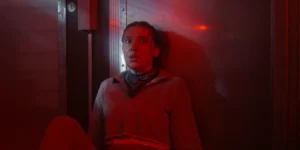This article, “themes of government mistrust and religious zealotry,” contains spoilers regarding Netflix’s Stranger Things Season 4.
Access the archive of news, recaps, and reviews of Stranger Things.
There are a few well-placed themes in the magnificent fourth season of Stranger Things. The Duffers have always used the issue of mistrust in the government. I mean, if you are trying to practice transparency, you do not run a secret lab in the middle of a floundering rural town like Hawkins, Indiana. From issues surrounding the conflict between generations, there are even arguments that many keep faith in agencies like the FBI and how they play a role that mirrors problems today. By the end of this season’s first volume of episodes, there will even be a spotlight on the game Dungeons & Dragons and the role religious zealotry played in its alienation of citizens.
Stranger Things season 4 – themes of government mistrust and religious zealotry
The Hellfire Club leader, Eddie Munson, is accused of the murders currently happening around Hawkins. While the Hawkins crew knows there is a dark wizard, the town’s top athlete, Jason, says Eddie is just a vessel for the devil. He later accuses the group who play the game of bringing dark magic from satanic cults. Jason feels the murders of Chrissy, Fred, and Patrick are satanic, ritualistic sacrifices.
In a study at the time, players of the game who devoted the most time and money to it felt more alienation than non-players and casual fans of the game (DeRenard & Cline 1986). This theme has been apparent throughout the series as the kids have been particularly abused in the past. However, this takes on a more prominent role when Jason makes accusations at a town meeting. Not to mention, he comes from a middle-class family. He uses his religious beliefs as a lens to explain something he doesn’t understand. This was a significant media story in the “lost” decade. Where now, fantasy games, prominent in esports, are more lucrative than the National Football League.
You will even see a scene supporting this with Mike’s father. This is a relatively benign supporting character we mostly see sleeping on his lazy boy as the quintessential 80s yuppie. He is a businessman who says we should trust the FBI. Later, he’s leaning toward judging his child’s infatuation with the fantasy game. He won’t stand up and call it for what it is — a witch hunt. He is the opposite of some, not just the woke college type, but middle-aged professors and social workers who directly opposed government agencies. They bravely stood up and demanded change.
Take, for instance, 1971. The Media, Pennsylvania incident was a historic act of civil disobedience that exposed Hoover’s FBI tactics. This shined a light and created a section of American citizens that reflects this past decade’s mistrust of the Trump administration. Here, you don’t know who to trust because the Duffers do not want us to trust anyone. For example, dueling government factions fighting over Eleven – The U.S. Military and the Department of Energy.
You have Hopper, who is on the oppositive end of that spectrum. He shares some of his backstories with Dmitri about how, when in Vietnam, he was used to transport Agent Orange (a toxin used to defoliate the jungles of Vietnam) to planes. These are two examples of rival beliefs in the U.S. Government at the time. Hopper, even before this season, was full of cynicism. Take, for instance, the final meal for the Russian prisoners — he sees through the pride and knows they are being used as pawns.
The issue of fanaticism, religious zealotry, and government mistrust has always been prevalent in Stranger Things. (Take, for instance, Dr. Martin Brenner and the lore of something called MKUltra being started at the Hawkins lab). However, the Duffers are beginning to show the direct effects of such actions on a wide range of people, even if the trust was regained in the 1980s since being tracked back into the record high in the 1950s, compared to the rock bottom the decade prior.
It meant a shift in public opinion, but the seeds of distrust remained, and there was a concerted effort to camouflage it.




